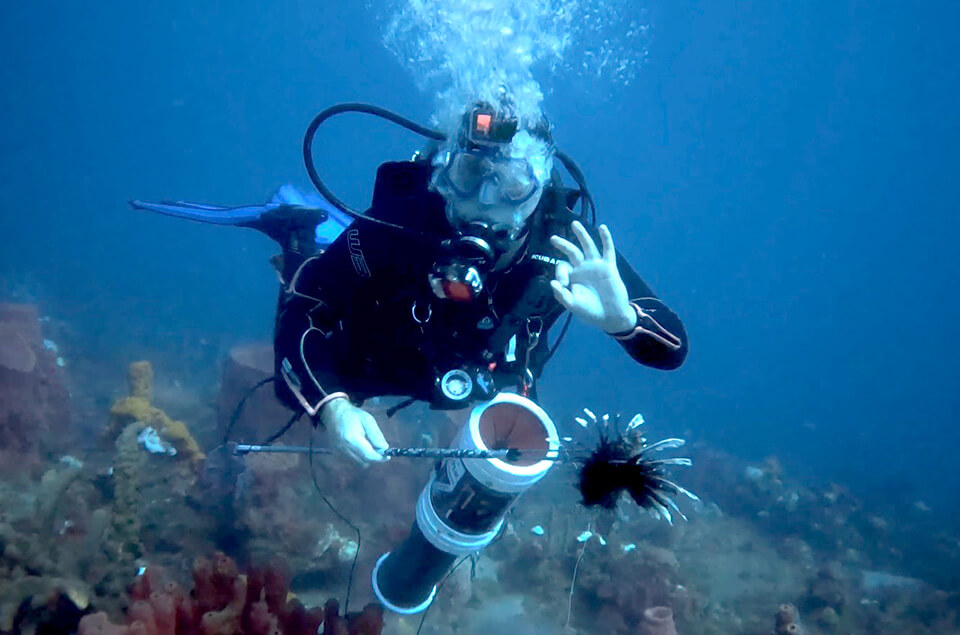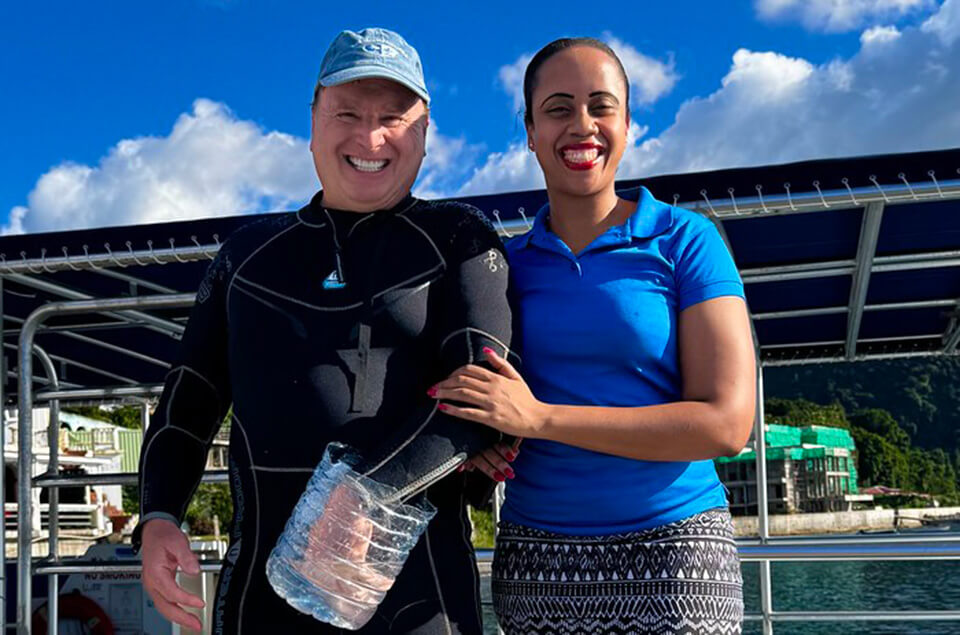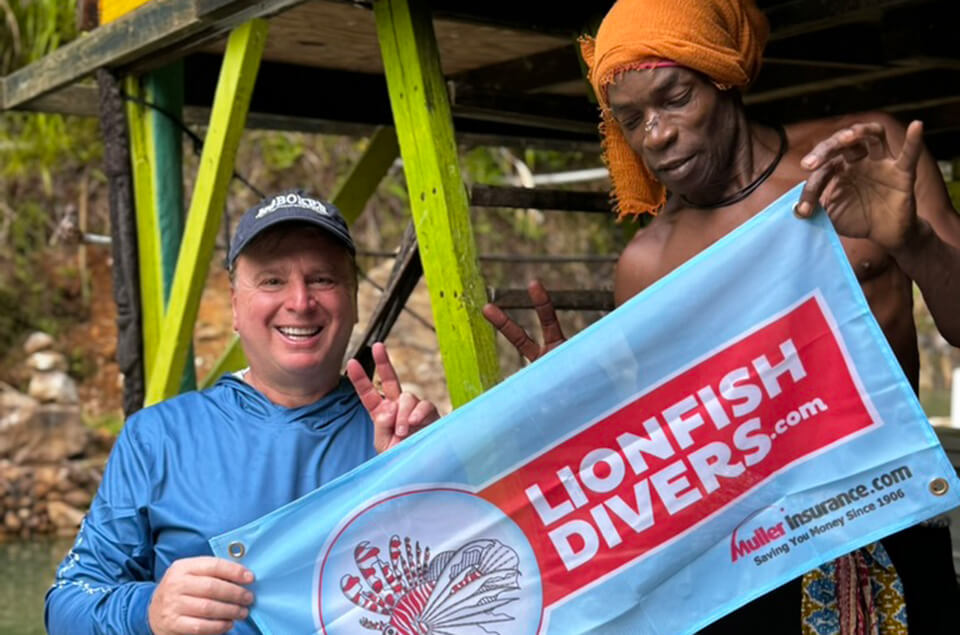Lionfish Hunting 101: How to Hunt for Lionfish

Lionfish are a species of fish that are becoming an increasingly popular hunting target due to their invasive status. Natively from the Indian and Pacific oceans, lionfish are now well-established in the Atlantic Ocean – but here, they are negatively affecting the ecosystems.
Lionfishdivers.com is a website dedicated to spreading awareness of the lionfish invasion in the Atlantic Ocean, as well as lionfish hunting. Run by Roger J. Muller, Jr., International Lionfish Hunter and Professional Scuba Instructor with vast knowledge of lionfish, learn more about hunting for lionfish from an experienced hunter himself.
Why Are Lionfish Hunted?
For the last three decades, lionfish have been consistently invading the Atlantic Ocean. Now, they are found all along the Eastern Seaboard and into the Caribbean Sea and Gulf of Mexico. Lionfish are considered an invasive species for a few reasons. First, they have no known predators. That allows them to thrive without the risk of being killed. They can also reproduce rapidly.
Lionfish are also quite greedy eaters. They eat up large amounts of food and populations of fish that are important to the proper functioning of ecosystems. They also out-compete these other species for food. That has resulted in damage to the underwater environment that is difficult, if not impossible to reverse.
The damage has also caused economic and environmental consequences for the residents of the areas. That includes impacts on the commercial fishing trade, tourism, and more crucial industries. To help prevent further destruction caused by this invasive species, people have begun participating in lionfish hunting, or the sport of killing lionfish and removing them from the Atlantic Ocean. Lionfish hunters travel around these invaded waters, mainly in the southern United States and the Caribbean, to search for and remove these non-native species.
How Is Lionfish Hunting Done?
Lionfish hunting is not the same as fishing for other species of fish in a few ways. Firstly, lionfish cannot be caught with a traditional reel and rod. That means lionfish hunters must dive to their level to hunt them.
The best way to do so is by spearfishing, a process that involves using a pole spear or a sling spear. Some hunters also use hand-held nets to hunt lionfish – but this is riskier because of the venomous spines that lionfish have. These venomous spines can sting lionfish hunters, so they must use special hunting equipment and techniques to stay safe during the process.
Lionfish hunting is best for certified scuba divers already skilled in diving. That is because not only does the diver dive deeply and carry gear, but they also focus on the hunt and avoid getting stung. Lionfish typically let divers get close to them because they don’t have known predators in the Atlantic Ocean. That allows the hunter to take their shot with a spear from around six to 12 inches away. After being speared, the lionfish must be put in a puncture-resistant containment device to prevent any stings.
Where to Hunt Lionfish
Now that lionfish are well-established in the Atlantic Ocean, they can be found and hunted in many areas. Hunters and divers have come across lionfish in areas including the U.S. coasts of Florida, North Carolina, and even New York, Central America, the Caribbean, and the Gulf of Mexico. There are also many lionfish-friendly dive shops that will assist you in your excursions. Lionfishdivers.com is run by Roger J. Muller, Jr., a scuba instructor turned lionfish hunter with more than 3,000 lionfish kills. Some of his favorite places to hunt for lionfish include:
Florida
The first lionfish in the Atlantic Ocean was found in Florida, now an invasive species. That is why Florida Fish and Wildlife Conservation Commission (FWC) encourages divers, anglers, and commercial harvesters to remove lionfish they spot in Florida waters.
No fishing license is required to harvest lionfish from Florida waters if using hand nets, pole spears, Hawaiian slings, or other spearing devices for lionfish collection. There is also no recreational or commercial limit on the number of lionfish an individual can collect from Florida. That makes the area great for avid hunters looking for lots of kills.
The Caribbean
Lionfish have invaded the Caribbean Sea and destroyed the coral reefs there. That is problematic because many residents depend on these coral reefs for tourism. Studies have shown that just a single lionfish living on a coral reef can reduce the presence of native reef fish by almost 80 percent. This reduction of fish in the reefs affects how healthy they are, impacting food and income sources for many people. That is why lionfish hunting is becoming increasingly popular in these countries.
Different Caribbean countries have different rules and regulations regarding lionfish hunting, so make sure to do your research beforehand. For example, Bonaire has particularly strict requirements, while Curacao has few guidelines and no regulations.
Hunt-Friendly Dive Centers
If you’re looking to hunt for lionfish wherever you go, look for lionfish hunt-friendly dive centers in your location. Lionfishdivers.com recommends places to dive for lionfish and become a certified lionfish spearer-hunter, many of them owned by friends of Roger Muller. These centers include:
Curious hunters can find these dive centers and more internationally, giving them a resource for finding a spot to learn lionfish hunting. For more information, check out our list of lionfish-friendly dive shops.
Individuals should consider these popular destinations for hunting lionfish and learning how to hunt for them. That is because places like Florida and the Caribbean are most affected by the lionfish invasion. Many negative environmental and economic consequences are happening because of it. That is what makes the hunting and killing of lionfish so imperative to the preservation of their environments. Although it cannot be reversed fully, hunting lionfish can help to keep these areas safe.
Precautions to Take When Lionfish Hunting
Lionfish have 18 venomous stinging spines. They typically use them as a defensive mechanism, usually when they’re touched by a human, whether on purpose or accidentally. The spines release a venomous neuromuscular toxin that causes burning and intense pain, swelling, bruising, and other troubling symptoms. Lionfish hunters can experience a lionfish sting if they don’t take the proper precautions when hunting. These precautions include:
- Have the proper equipment to hunt lionfish, including a spear, spear tips, and a containment device like the Zookeeper or Aquatic Hunt lionfish locker.
- Know what to do in case of a lionfish sting.
- Have gear for treating a lionfish sting, including a first aid kit, puncture-resistant gloves, and a thermos of hot water.
Lionfish hunters should also know that lionfish can still sting up to 48 hours after dying if their spines are still attached. Hunters should not touch their venomous spines before removing them using special puncture-proof gloves.
Frequently Asked Questions about Lionfish Hunting
Do you need to know how to scuba dive to hunt lionfish?
Scuba diving is not required to hunt lionfish, as freediving can also be used. However, scuba diving is the recommended method because it can be hard to carry the required equipment and go to the correct depth for lionfish hunting when freediving. Therefore, it’s best to get your scuba diving skills in check before moving on to lionfish hunting.
Do you need to be certified to hunt lionfish?
It depends on where you are hunting. In Florida and other areas where lionfish pose a threat, there are no specific regulations about certifications that divers need to hunt lionfish. However, it’s always important to check out the local regulations before leaving, as some areas have more stringent guidelines than others.
Is lionfish hunting dangerous?
Lionfish hunting is not particularly dangerous if it is done properly. However, it does present risks, particularly from a lionfish sting. Lionfish stings inject a venomous toxin into humans. However, they are typically not life-threatening and have side effects that resolve within a few weeks.
Can lionfish hunting reverse the lionfish invasion?
Unfortunately, researchers don’t believe it is possible to reverse the lionfish invasion of Atlantic waters, especially through conventional methods. However, human intervention is one of the only ways to help control the lionfish population there. That is why lionfish hunting is helpful in these areas.
What can you do with lionfish after hunting?
After hunting lionfish, you can use them in a few ways. One of the increasingly popular ways is by cooking and eating lionfish, as they are edible, delicious, and can be prepared in a variety of ways. People are also making lionfish jewelry and items with the uniquely patterned fins of the lionfish.
Request More Information on Lionfish Hunting
Are you interested in fighting the lionfish invasion by learning to hunt lionfish? Join Roger J. Muller, founder of Lionfishdivers.com, in his mission to eradicate this invasive species and help restore global marine ecosystems through lionfish hunting. To learn more about getting involved in the hunt, contact Roger J. Muller, Jr. at Lionfishdivers.com today.





